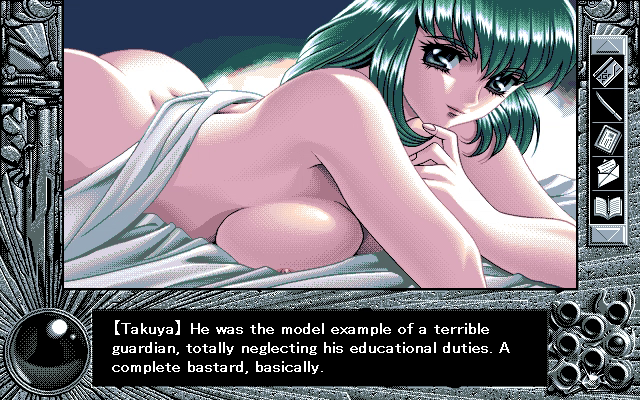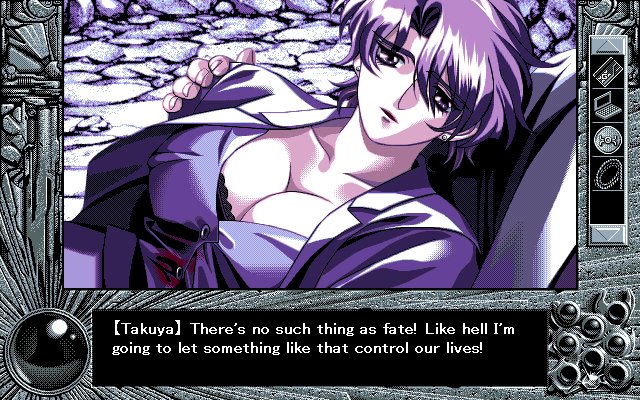In the very dream of the Prologue, despite her husband’s verbal and physical abuse of their son and claim to own her body, Kaytia cannot help but compliment Koudai’s cuteness without irony. As Ayumi tells Takuya, “You two were always like that [i.e. fighting]. Even though you were really on the best of terms.” The ambivalent emotions of the Oedipus complex manifest in the tension between Koudai’s genuine cruelty toward his son and how nonetheless he knows best. The point may be summed up after Takuya has sex with Kaori on the Ayumi route, when she admits that Koudai was also one of her sexual partners. Takuya thoroughly condemns his father, concluding,

Kaori responds, “But didn’t you grow up splendidly? […] In a way, children grow up learning from the bad examples set by their parents.” Although Takuya is an incestuous pedophile, failing student, and sex criminal with little intelligence and an explosive temper, in YU-NO, this is a splendid man, what a man should be, a man in Koudai’s mold. The way Takuya has learned from Koudai’s “bad example” is by exactly imitating it because, in YU-NO, it is not a bad example.
Takuya’s arc, to whatever extent his scant development qualifies, is accepting that the other characters, even the villain Ryuuzouji, who praise his father’s brilliance and compassion are correct. The player’s quest is to locate and defeat Koudai. This quest is linked with a journey to defy predestined outcomes. At the end of her route, Takuya tells Kanna, “I’ll never let myself become [my old man’s] puppet.” He remarks to Mitsuki as she dies on the Mio route,

But Takuya is completely under the control of a predestined fate, the same time loop that ensures Dela Grante will fall to Earth, as established by the existence of his daughter in the Prologue. Takuya begins his quest on Koudai’s command in the letter. The player must bring Takuya along exactly the path Koudai wants. He has moments of doubt over his heavenly father’s wisdom. But Takuya’s arc, such as it is, is that he learns to accept fate, the fate Koudai plots for his son, slavery to which is the gameplay. And this acceptance rewards Takuya with his daughter.
YU-NO is almost a more regressive take on Oedipus Rex. As Freud observes in The Interpretation of Dreams while inventing the concept of the Oedipus complex, the tragedy of Oedipus Rex is a “tragedy of destiny” that “depends on the conflict between the all-powerful will of the gods [i.e. fate] and the vain efforts of human beings threatened with disaster” (307–308). Oedipus’s failure to avoid his fate is the tragedy. He and Jocasta realize they have not escaped the cruel will of the gods and that they are both son and mother and husband and wife, whereupon Jocasta dies by suicide, and Oedipus, despairing, blinds himself and leaves his home in exile. In comparison, in YU-NO, “fate” is Koudai’s will rather than that of the Greek gods. Takuya’s impotence before his god, Koudai, results in incest and eternal exile from his home and the player’s simulated home, Sakaimachi, the place that the player, in a naïve reading, would be expected to like. But in YU-NO this is a happy ending, a fantasy to be yearned for. Then again, Oedipus has the strength to actually defeat Laius.
Takuya learns also, and just as importantly, that a man should be like the violent, explosively angry blowhard who admits to happily watching his son and granddaughter have sex: “I’ve observed every little move that you and your daughter made.” This comes shortly after Takuya plows Yu-no doggy-style, so that this line appears in a positive summation from a paternal voice of moral authority should raise serious questions about the moral universe of YU-NO. Then, after suggesting Takuya might get together with another version of Ayumi, Koudai appends, “Oh, right. You’re together with Yu-no now…” and chuckles. Takuya’s attitudes and actions in the Epilogue earn the approval of every sympathetic character and leave him irresistible to every woman he meets save Illia, with even his daughter desperate to get into his pants, just as the chad Koudai wins the adoration of everyone he meets except for his son.